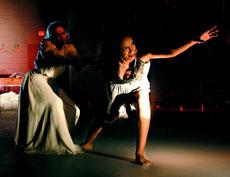New Krannert production has ‘Intimate’ touch

Actresses practice at the dress rehearsal for “Intimate Apparel,” which portrays an African-American seamstress in New York at the beginning of the 20th century, on Tuesday night at the Krannert Center. The play will run all this week. Josh Birnbaum
March 30, 2006
On a stage that blends into the small audience of 152 people, a seamstress and the corsets she crafts intertwine the lives of the rich, the poor, the black, the white, the lonely and the married in turn-of-the-century New York City.
The play “Intimate Apparel,” which opens today and closes Sunday at the Studio Theatre in the Krannert Center for Performing Arts, highlights the life of Esther, the seamstress, who struggles to find a man who will love her as much as she loves her work.
Esther, played by Victoria Caciopoli, graduate student in acting, is the single 35-year-old black seamstress who lives in a boarding house with her friend, a prostitute named Mayme, played by Beaulivea Greene, a senior in FAA.
“Women had less options back then,” Caciopoli said. “You either learned the trade like sewing . or you got married.”
Esther receives a letter from a Panama Canal laborer, George, played by Jason Dirden, graduate student. With the help of her wealthy client, Mrs. Van Buren, played by Leslie Ann Handelman, graduate student, Esther begins to write back. Soon she becomes swept up in a long-distance love that materializes when George comes to America in Act 2.
Get The Daily Illini in your inbox!
Esther also experiences a more immediate love with a pious Jewish fabric merchant, Mr. Marks, played by Brent T. Barnes, graduate student.
“They really love each other and all the scenes they have are really sweet,” Handelman said.
The conventions of the period, however, allow little room for interracial relationships, and tension exists between the two characters.
Although Mr. Marks’ religion does not allow him to touch a woman who is not his wife or relative, he and Esther are connected for short instances through the fabric they both handle.
“Ultimately it’s really just a play about somebody just wanting to be touched,” said Robert Castro, the director, who lives in New York but has been here for a year.
Not only is Esther moved to sneak a touch of the merchant’s back, but also Mrs. Van Buren, living in a loveless marriage, cherishes the feel of Esther’s corsets and the seamstress’s hands on her body.
“To me it’s sort of a snapshot of the 1905 New York life and I would hope that people will look at it for what it is,” Handelman said.
She said she wonders if more conservative audiences will be shocked by controversial topics portrayed on stage, like affection between two women.
The staging of the production leaves little room for distractions from the acting, because there are no changes of scenery.
“When we started working,” said Renata Braga de Almeida, stage manager and graduate student, “(Castro) and the designers decided that the most important part of it was the text and that the text offered all of those things (the props). . And so he kind of started stripping away and (the play) has that quality of kind of like a performance art.”
Castro said he and Micah J. Maatman, scenic designer and graduate student, went through about 110 ideas for the set of “Intimate Apparel”.
“We weren’t settling,” he said.
Photograph portraits as part of the background and a table stacked with white shirts, inspired, Castro said, by installation artists Christian Boltanski and Ann Hamilton, are the most visible elements of the scenery.
“[This allows] for the actors, in a sense, to have nothing to hang on to except their emotions and that touch that they’re searching for,” he said.
Written by playwright Lynn Nottage “Intimate Apparel” first opened in 2003.
“We’re trying to do more new plays that have been successful around the country,” said Henson Keys, chair of the University’s acting program, “and this play, ‘Intimate Apparel,’ has been a major success in New York.”






